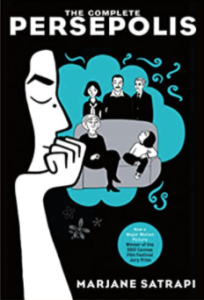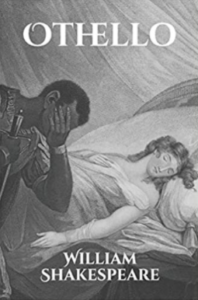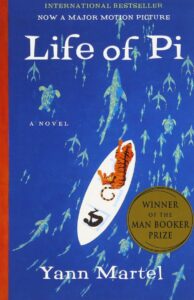Course: ENG 2400
Title: Films from Literature
Professor Sean Scanlan
SPRING 2021
Instructor: Professor Sean Scanlan
Section: OL64
Time: Thursdays 2:30 – 5:00 pm on Zoom
Place: ONLINE; this class is Synchronous which means students must meet at designated times
Office Hours: Wednesdays and Thursdays, 1 – 2pm. On Zoom. See links on the right sidebar.
Course Website on OpenLab: https://openlab.citytech.cuny.edu/profscanlan-english2400-ol64-spring2021/
E-mail: sscanlan@citytech.cuny.edu
Pre-requisite: English Composition 1101 (3 hours, 3 credits)
Course description: ENG 2400 is a course that allows students to examine the relationship between films and their literary sources. Through classroom discussion and out-of-class assignments, students will analyze classic and contemporary literary texts and their cinematic versions. Students will examine the relationship between film and literature, with specific focus on the techniques used in fiction, drama, and film. Students will focus on the similarities and differences of literary works adapted into films.
This course is writing intensive.
Course Objectives:
•Recognize literary devices such as foreshadowing, symbol, and stream-of-consciousness.
•Understand forms and techniques of both literary and cinematic narratives.
•Investigate technical, cultural, political, historical, and economic contexts that shape the construction of films based on published works.
•Develop communication skills by discussing and writing about literature-based motion pictures employing
analysis and comparison/contrast. We will review and utilize Modern Language Association (MLA) citation and style in our formal writing assignments.
•Improve reading/viewing skills that enhance appreciation of the relationship between literature and films.
•Enhance critical thinking skills.
Grading Assessments:
| Item | Percentage |
| Essays (2) | 40% |
| Quizzes (3) | 20% |
| Final Exam | 15% |
| Attendance/Participation/Virtual Coffeehouse Posts (3) (unique course content) | 25% |
| 100% |
| Required Texts
1. Marjane Satrapi, The Complete Persepolis, 2007. Pantheon. We will read this free version: https://rhinehartadvancedenglish.weebly.com/uploads/2/2/1/0/22108252/the-complete-persepolis-by.pdf
2. Shakespeare, William. Othello. We will read this free version:
3. Yann Martel, K. Life of Pi. Originally published by Mariner in 2003. We will read this free version: https://www.scollingsworthenglish.com/uploads/3/8/4/2/38422447/_life_of_pi_full_text_pdf.pdf
Other readings will be available on our course website in the Readings menu tab |
In order to help us improve college-level grammar and writing, we will use a free, online grammar guide called Purdue OWL, published by Purdue University. http://owl.english.purdue.edu/owl/
Other Materials:
I encourage students to use a physical, paper notebook for taking notes in addition to typing notes on a digital device. This blend is encouraged, but it is up to each student to decide the best way to write, organize, and review notes. Students must devise a system to record, store, and organize the course materials. It is very important to save all work for this class. Devise a filing system that allows you to maintain homework and essay drafts, final copies of all major assignments, and research notes, outlines, and written evaluations. In addition to keeping a copy of all your work on the hard drive of your computer, save all work on a stable format such as a flash drive or on a remote hard drive/server such as iCloud, Dropbox, or Google Docs. Never throw away or delete ANYTHING until after you have received your final grade. Computer malfunctions are bound to happen–do no let them harm your grade. Be proactive and always email any issues to me well in advance of due dates (if possible). This may be a challenging semester in terms of handling technology (and life) during a pandemic, but I want to set the tone by calling for open and generous communication.
Important Notes:
1. Attendance: Synchronous classes meetings resemble traditional on-campus classes where students must be
(virtually) present at the same time. Though they are conducted virtually, synchronous classes meet in real- time. Students must commit to scheduled class times and sign onto their virtual learning platform on schedule. During these classes, students will engage with the instruction during online lessons and presentations and have virtual class discussions. Assignment deadlines and exams days/times are maintained and included on our class syllabus. Students are not penalized for missing a class, but Participation is connected to attendance–students cannot gain participation points if they miss class.
2. Drafts and Typing: The two essays will require organization, honesty, and clarity. The essays may require drafts. If you have word processing questions, please ask me. All students have access to Microsoft Word. You can also use Google Docs for free (https://docs.google.com/) or Open Office for free (www.openoffice.org/).
3. Late Papers: For each day that an assignment is late, ten points will be deducted. After ten days, the assignment will be recorded as a “0.”
4. Homework Requirement: According to Federal eligibility requirements for a college or university in the US, 3 hours of in-class contact time require approximately 6 hours of homework, study, and/or preparation per week. This is a CUNY standard. And this requirement is also referred to as a Carnegie Unit.
[See: https://www2.ed.gov/about/offices/list/ous/international/usnei/us/credits.doc]
5. College Policy on Academic Integrity: Students who work with information, ideas, and texts owe their audience and sources accuracy and honesty in using, crediting, and citing sources. As a community of intellectual and professional workers, the College recognizes its responsibility for providing instruction in information literacy and academic integrity, offering models of good practice, and responding vigilantly and appropriately to infractions of academic integrity. Accordingly, academic dishonesty is prohibited in CUNY and at New York City College of Technology, and is punishable by penalties, including failing grades, suspension, and expulsion. The complete text of the College policy on Academic Integrity may be found in the catalog. Is the unauthorized use of another person’s ideas, language, or research as your own, whether intentionally or unintentionally. City Tech does not tolerate plagiarism. Using proper documentation and textual analysis will help you avoid plagiarism. If you have any questions about plagiarism, please ask me. Any cases of plagiarism or other forms of academic dishonesty will result in a failing grade and appropriate administrative measures. Please familiarize yourself with City Tech’s policies on academic honesty in the college catalog: http://www.citytech.cuny.edu/catalog/docs/catalog13_14_sp14ver.pdf (pages 60-1)
6. Be on time: tardiness disrupts the entire class.
7. The Atrium Learning Center: I encourage all students to take advantage of the writing tutors at the Learning Center. This is an excellent recourse for writers of all abilities. ATRIUM LEARNING CENTER: Atrium Building LG-18: https://www.citytech.cuny.edu/alc/writing.aspx
UPDATE: The English Department is running a new Writing Center. It is open for distance learning help concerning writing and literature. Students needing writing help should email CityTechWritingCenter@gmail.com, and they will receive a fast response.
8. Revision Policy: Revision Policy: students may revise the first major essay. The revision must be submitted, at the latest, two weeks before the end of the semester (May 13). The overall grade for the essay will be the average of the original essay grade and the revised essay grade.
9. Accessibility Statement: City Tech is committed to supporting the educational goals of enrolled students with disabilities in the areas of enrollment, academic advisement, tutoring, assistive technologies and testing accommodations. If you have or think you may have a disability, you may be eligible for reasonable accommodations or academic adjustments as provided under applicable federal, state and city laws. You may also request services for temporary conditions or medical issues under certain circumstances. If you have questions about your eligibility or would like to seek accommodation services or academic adjustments, you can leave a voicemail at 718-260-5143, send an email to Accessibility@citytech.cuny.edu or visit the Center’s website at:
http://www.citytech.cuny.edu/accessibility/ for more information.
10. Microsoft Office: The City University of New York provides Microsoft Office 365 for Education to students at participating colleges, including City Tech via the Microsoft Office in Education program. You sign in using your Blackboard credentials (this is different than your regular CityTech email) and have online access to MS Word, Powerpoint, Excel and other programs in the MS Office Suite. You may also be eligible to download the Suite to your computer. For more information, see THIS LINK .
12. Advisors: The transition to college is challenging for everyone. It is helpful to periodically reflect on how you are doing in your classes, and how your anticipated area of study (major) is progressing, as well as to plan next steps. Academic advisors are able to help you navigate these paths. If you are in SEEK or ASAP or have declared your major, you have an assigned advisor with whom to schedule appointments. Others should seek out appointments with Dr. Julian Williams, Director of Liberal Arts & Sciences, jwilliams@citytech.cuny.edu
13. Students Without Devices: For students who don’t have devices, there is a webpage for them to fill out to request a loaner. This is the address: https://www.citytech.cuny.edu/loaner/






Leave a Reply